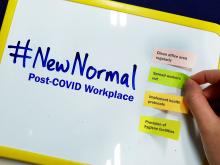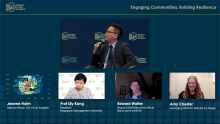- Read more about The Ecosystem Advantage
- 1654 views
Companies that wish to succeed in today’s environment need to innovate by tapping on a wide range of partners with differing skills, experience, capacities and networks.
How can you change a 2.6-million-year-old habit?
That’s when humans first added meat and marrow to their diet, providing us with a rich (and delicious) source of protein, iron, zinc, B vitamins, as well as essential fatty acids.
Organised by the Retail Centre of Excellence (RCoE), the annual Asia Retail Leaders Conference was held on 17 November 2021 at the Singapore Management University Mochtar Riady Auditorium. The full-day hybrid conference brought together 11 industry experts from the retail and academia sectors, was attended by more than 300 participants.
The theme of the conference, Pivot or Perish, saw experts sharing insights on a range of topics, from the impact of digital transformation to changing consumer expectations and purchasing habits in a post-pandemic environment.
At the core of every family business is the need to nurture an enduring legacy for future generations. But besides maintaining a financially viable business that thrives across several generations, family business leaders are also bestowed with the responsibility of creating sustainability in every sense of the word.
From income losses and social distancing to interruptions in healthcare provision, the Covid-19 pandemic continues to disrupt the lives of many around the world.
The Covid-19 pandemic has caused unprecedented devastation across the world. Lives and jobs have been lost, the healthcare sector has been stretched thin, and a shared sense of loneliness and despair has rippled across the globe. Yet, as a community, we have not suffered equally.
When both the rich and the less privileged had to undergo lockdowns and fell ill last year, many thought that Covid-19 would serve as a much-needed equaliser. But as the crisis quickly unfolded, deep inequalities within our society were brought to light.
In light of the ongoing pandemic, changing financial landscape and evolving job market, are the young adults in Singapore able to withstand financial challenges that come their way? How financially literate and resilient are they?
These are key questions the Citi Foundation-SMU Financial Literacy Programme for Young Adults aims to understand in its inaugural survey conducted between March and April 2021.
Employers have strong grounds to do so but should avoid differentiating for wrong reasons like presenteeism, Singapore Management University’s Jared Nai says.
When the Government again relaxes rules and allow more to return to the office in Singapore, we probably will not see huge swings in work arrangements.
At least not immediately, when many big business names around the world are allowing employees to continue working from home (WFH) on some days, likely prompting others to follow suit.
Universities play a key role in building resilience, said SMU President, Prof Lily Kong. Research done by universities can make a difference in strengthening societies and communities. The academic sector contributes through the graduates whom universities nurture, who go on to add value by creating solutions and ideas that address adversities faced by societies.
Money is said to make the world go round. But does it also help green the globe?
The global economy is increasingly reliant on natural resources, yet the rate of consumption continues to exceed the speed of regeneration. This unsustainable behaviour is driven by several factors, including population growth, technological advancement, and rising living standards. As a result, there is a growing need to encourage a shift in sustainable behaviour in individuals and businesses.











